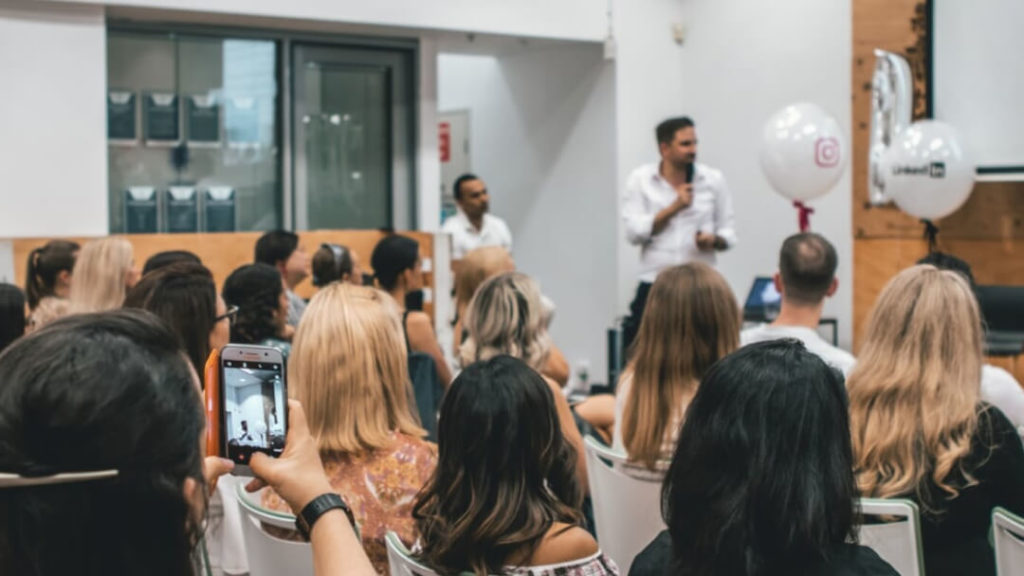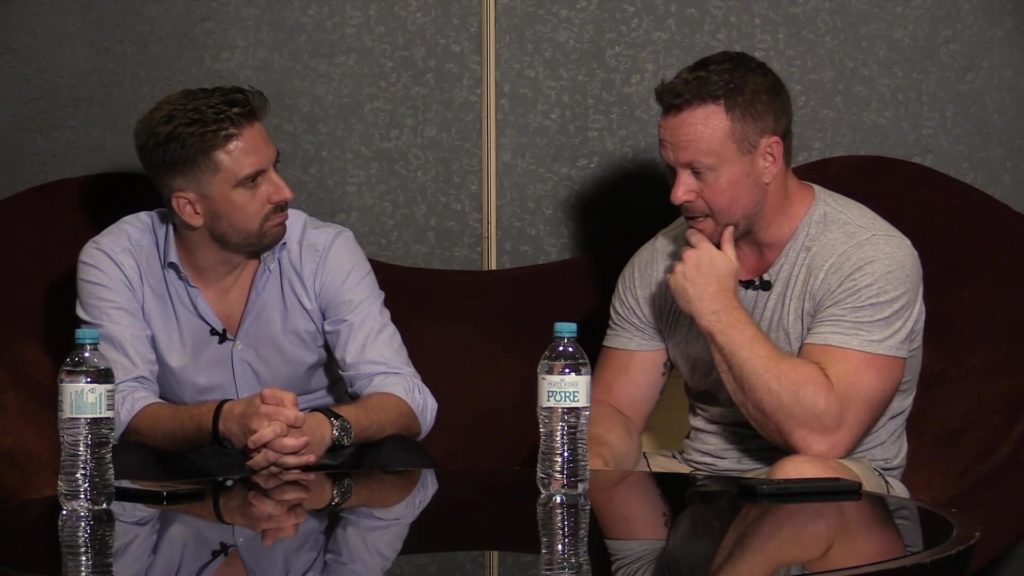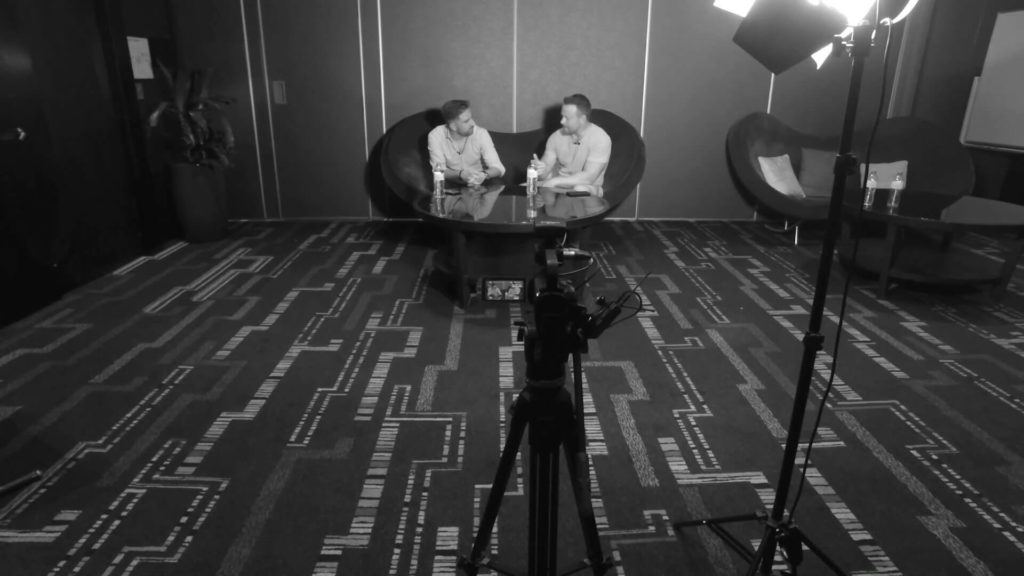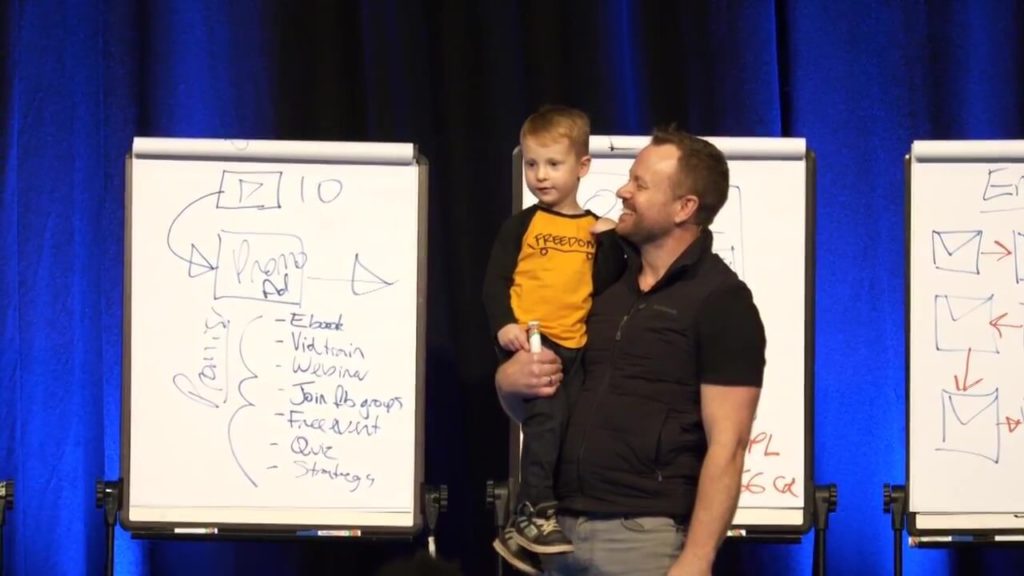Kerwin Rae Shares His Social Media Secrets
When I think of who’s really dominated in the social media space in Australia, there is one man that springs to mind.
Kerwin Rae has a following of well over a million people, and compelling content which covers business, mindset psychology, high performance, health, parenting and relationships.
We sat down to chat about his journey and secrets behind his social media and entrepreneurial success.
– I think it was 2016 when I tuned in on YouTube on The Social Experiment. And you said, “Who the f@#k is Kerwin Rae? The world’s changed. Our marketing’s crap, and this is what we’re going to have to do.” Could you share a bit of background, please?
– Yeah, look, I’ve been in the business of, yeah, buying, building and selling businesses now for almost 20 years.
And I think it was about two and a half, almost three years ago now, coming up on three years, I think, in March next year. May next year. Yeah, we just realized that our marketing, and I’m a marketer, but I just realized our marketing was sucking.
We weren’t getting penetration, we weren’t breaking through like we used to. The old direct response, call-to-action environment just wasn’t working, and so we basically embarked on a mission which became The Social Experiment, which we documented to transition from being a traditional marketing business to being a social media marketing business.
And yeah, like we already had a very successful business already, we were very blessed through a lot of hard work, but, you know, since the launch of The Social Experiment, yeah, we’ve, I think we’ve had almost 3/4 of a billion video views and, yeah, the clock’s still ticking.

And most of that, by the way, is organic, so it’s been really well received.
– Yeah, absolutely. And I’ve been following your journey closely, and what I’ve really done is I’ve taken what you’re doing and just isolated LinkedIn. And just focused on LinkedIn video, and there’s a lot of organic traffic at the moment, so thank you for leading the way for us.
– No, you’re welcome. You’re doing very well.
– Along the way there must have been some challenges?
– Lots of challenges. That’s business, right?
– I don’t think there’s anyone that’s gone, “Nah, actually everything is going well.” So what was one of the ones that happened since you started the social media experiment?
– Look, I think there’s a couple that pop to mind, but probably the most challenging one is, was actually the documentation of the breakdown of my marriage, ’cause we were actually, we were all in on the project.
We were basically filming everything. So we were, in essence, The Social Experiment was about creating a reality TV-style web documentary where we documented, like, from the moment I walked in in the morning, to the moment I left in the evening.
I had a camera on me 24/7, and even on, you know, sometimes in the evenings and weekends, and touring and everything else, and my wife worked with me in the business, and, you know, it was during that early stage of The Social Experiment our relationship actually started to break down.
So that was probably one of the more challenging things, because one of the things that I like about The Social Experiment and I like about, you know, doing what I do with the team that I have, is it creates an enormous level of transparency.

And I love authenticity, like I’m very much passionate about just being a real and genuine version of yourself, and in that environment it really just made me have to show up as the most authentic version of myself regardless of what was going on, you know?
Breakdown and all. And yeah, look it was quite a challenge, and to see, to reflect back on it when I see the episodes in retrospect, yeah, it was quite a challenging thing to watch your own marriage breakdown play out on, I guess you could say, almost like on a TV screen.
– Thanks for sharing that with us.
– Yeah, you’re welcome.
– And what would be one of the traits that you attribute to your success as an entrepreneur?
– Look, I think there’s many variables that create many characteristics, many character traits that are required, but my, probably my strongest trait is my resilience.
I’ve got really strong grit, and what that means is I have the ability, I’m no different to anyone else, I have just as many challenges, if not more, than most people.
But what I have is the ability to sit in my problems and actually find clarity in them, and be able to suffer without experiencing, without experienced pain with our suffering, you know?
Because business is very painful, life is very painful, and, you know, I think that’s a challenge for most people, is they pursue something that they love in the form of business, but then when it gets difficult they experience pain, you know, in the form of the let down or disappointment, but they allow that pain to turn into suffering.
And then when you start to suffer, that’s when life becomes heavy.
That’s when life becomes hard.

And for me, you know, I won’t say that I was born this way but I’ve certainly spent a disproportionate amount of my life learning how to feel comfortable in really uncomfortable situations. You know?
I pursue vigorously, you know, discomfort. I pursue stress. I pursue, you know, almost like a madman, situations that will push me to my absolute extreme, but then in the moments where I’m pursuing them I’ll pursue peace. I’ll pursue presence.
I’ll pursue equanimity to be able to maintain as much clarity as possible in situations that most people would be losing their shit in.
– Yeah. What an awesome trait to have. You know, if you can be comfortable being uncomfortable, you can’t help but grow.
– Exactly, you know? And it gives you clarity as well, because I think the challenge for most people, they experience pain, and then they release chaos, and that comes in the form of emotions. And we can’t think straight when we have emotions running through our head.
– So talk to me about, moving back to social media, I’m curious. Since I’ve been doing this video marketing in particular on LinkedIn, I’ve noticed a big impact on my business. The quality of clients,
– Yeah.
– And certainly getting more inbound leads. But it’s very difficult to measure. How do you justify, you know, the amount that you’re investing in social media without being able to measure
– That’s a good question, you know? And that’s, I come from the ROI background of direct response where, you know, you do a campaign, you get a response, you measure how much the campaign costs, you measure the response, you take your profit out, divide it by the amount of sales you’ve got, and there’s your ROI per, you know, per lead.
Whereas with social media it’s a completely different animal, you know? It really is. It does require a long-term perspective.
It’s like, but it’s beautiful because I think anything beautiful in life requires us to take, you know, to take the long perspective.
Because when we’re looking for that instant gratification, when we’re looking for that instant measurable, I think sometimes we get lost in, you know, the actual doing of what it is that we’re trying to do, rather than the actual journey of what we’re actually on.
And this is the beautiful thing about, you know, video marketing as an example, it does require the ability for you to build a relationship with someone, you know? If you look at social media, social media is actually governed by a psychological principle called the mere-exposure effect.
The mere-exposure effect is a psychological phenomena whereby people tend to develop a preference for things once they become familiar with them. And they don’t become familiar with a product, or a service, or a brand anymore just by you saying, “Buy my stuff,” you know? You actually have to build a relationship, you know?
It’s much like going to a bar. If you go to a bar, most people who, if they go to a bar, and they just walk up to people and they ask them to go back to their room straight away, chances are you’re going to get a lot of slaps in the faces.
Whereas if you focus on, you know, meeting people, approaching people, getting to know people, finding out what their interests are, finding common ground and creating, you know, a level of relateability, that builds a relationship, then over a period of time you’re going to create that natural attraction whereby people are going to want to know more, and as a result they’ll end up doing business with you.
So it’s not something that you can necessarily measure in the short-term, it is something that is measured in the long-term. But as you said yourself, your business is, by the sounds of it, it’s gone gangbusters.
As a result of video, you know? As has ours. And I think that’s one of the biggest reasons that most people don’t do it, is because it does take a little bit of time.
-And that’s great.
– People will say to me, “Oh, why are you interviewing Kerwin? What are you trying to get? Like, what are you trying to do here?” You know, just, anything I do on social media is designed to add value.
– Yes. And that’s the long-term thing. And that’s the thing with this mere-exposure effect, people, you know, going back in 2005 you had to get about 5.4 exposures to trigger familiarity, which would be enough for someone to approach you. Now it’s about 18 to 20 exposures.
And if you’re putting a call to action in front of someone, like, 18 to 20 times, you’re going to piss them off.
You’re going to create a negative sentiment. Whereas you’ve got to learn how to capture their attention, their imagination, with information, education, entertainment, humor and relateability with content that draws them in to actually want to consume, so that they’re not only consuming the information that’s relevant to the brand, but they’re also building a relationship with you in the process.
You’re getting an exposure. And every time they watch a video that’s one more exposure, one more exposure. And, you know, the goal is to get to 18 to 20, and then they’re, in most cases they’re going to be ready to do some form of business with you.
– I remember one episode of Social Experiment, somebody raised, in your team, that, “Oh, my friends keep asking me what the hell we do. You know, we should explain it.” And you said, “No, that’s exactly what I want, for them to think.”
– Yeah, I want them to be curious, ’cause you’re exactly, you’re 100% right. Like, people were saying, they’d say on YouTube and on Facebook, they’d say, “What do you do?” And it’s completely like, and I would say to the team, “Don’t answer that question. I want curiosity.”
– Yeah.
– You know? ’cause it’s, like, people love novelty, you know? Novelty has this incredible chemical response in the brain. It produces nor epinephrine and dopamine. And that’s that cliff-hanging moment where people want to know more. And if you give people everything, all the information that they need, they’re no longer curious anymore.
They don’t want to know anymore. And so, you know, I love drip-feeding information in a way that is curious. It is. And that’s why if you look at our content, and I’m a business guy, but we touch on relationships.
We talk on not just business, but we talk on relationships, we talk on parenting, we talk on health, you know? Fitness. We talk on a whole range of different things because, you know, business to me, it’s a life to me.
It’s not one dimensional. People can relate to many different aspects of you and you just look for the angle that they can relate with the most based on the things that you’re most passionate about; that you’ve got a depth of knowledge that, you know, can actually add value to someone’s life.
– And then you capture the market.
– Kerwin, if you could be a superhero, who would you be and why?
– Ironman. Ironman. Didn’t have to think about that. I’ve got him everywhere. Even my son, he thinks he’s Ironboy. My son actually is convinced that we are both superheroes here to save the planet.

How old is he now?
– He’s just turned 5, Noah, I love you pal, but yeah. He’s convinced that I’m a superhero. I’ve convinced him that he’s a superhero, and he’s convinced that we’re here to save the world.
– I love Ironman. Big house, fast cars.
– Ah, but he’s got the brains, you know, he’s got the brains, the intelligence, and the, and the suit, you know?
And I think, in many respects I think a lot of us are, like, we don’t realize that we can just put on a suit to become who we want to be, without being anything different from who we really are, if that makes sense.
-You know, I think he’s a great metaphor for life.
– Kerwin, I’m coming to the event tonight. Perth’s Fast Growth Summit. Looking forward to seeing you in action.
– Thanks, man. Appreciate it.
About LinkedIn Heroes
LinkedIn Heroes was started to deliver the inspiration and strategies you need to accelerate your entrepreneurial journey to success.
To ensure you don’t miss an episode of LinkedIn Heroes subscribe to Nathanial’s YouTube Channel.
One comment on “Kerwin Rae Shares His Social Media Secrets”
Leave a Reply
Free LinkedIn Starter Pack
- 8 Steps to Creating an All-Star Profile
- How to become a Top Seller on LinkedIn
- LinkedIn Profile Review & Free 30min Coaching
Thanks for the good article, I hope you continue to work as well.Спаситель на продажу